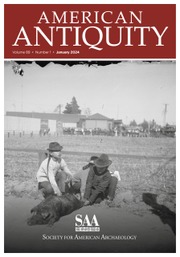Article contents
Honk If You Know Darwin: Brief Reply to Dunnell and Wenke
Published online by Cambridge University Press: 20 January 2017
Abstract
Having previously responded to one anguished claim that societal evolutionism is so a subset of biological evolution, it is interesting now to consider the position that societal evolutionism owes nothing to the natural sciences. Dunnell and Wenke's schoolmasterly comment, while properly underscoring the independent idea of evolution as part of social philosophy, curiously adumbrates a number of biological issues that by their own standards are not wholly relevant to the matter at hand. Their slight understanding of the content of ancient documents—the nature of these documents as archaeological artifacts and their value in explaining the past-betrays an unfortunate tendency toward archaeological solipsism.
- Type
- Comments
- Information
- Copyright
- Copyright © Society for American Archaeology 1980
References
References Cited
- 1
- Cited by




